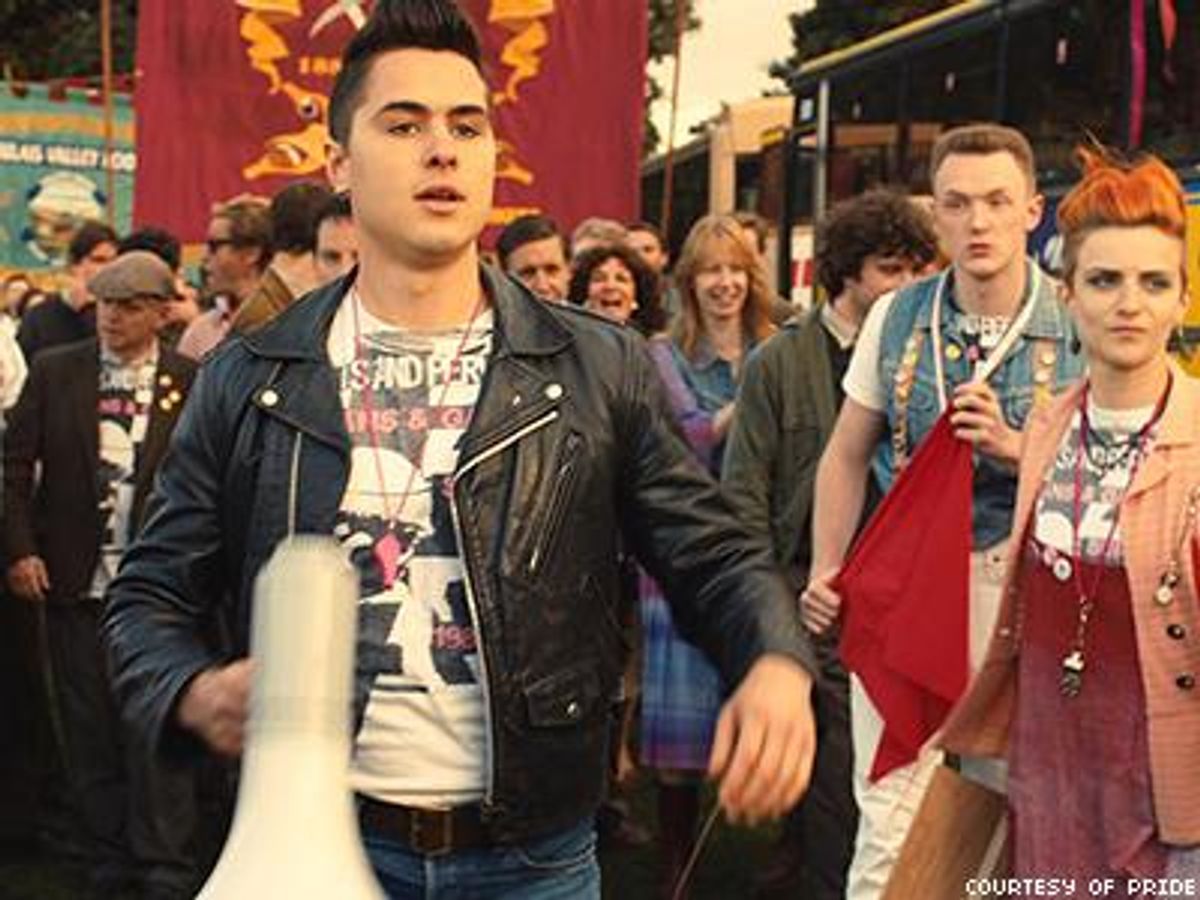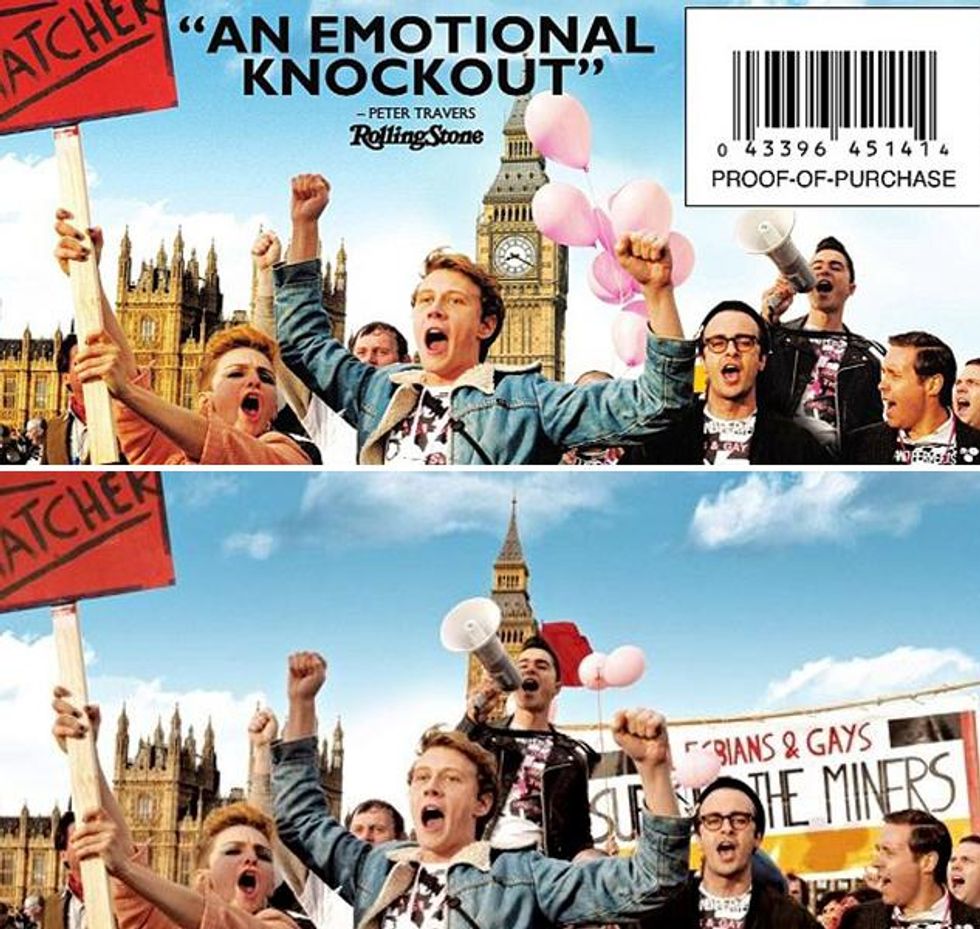"This is a gay and lesbian group, and we are unapologetic about that."
So says Mark Ashton, the leader of Lesbians and Gays Support the Miners, when someone suggests the group remains anonymous, in the Golden Globe-nominated film Pride. It seems Sony and CBS Films, the film's distributors, see it differently, though. In a still unexplained move, the American cover of the DVD -- released last month -- omits any reference to LGBT people, despite the fact the film is about how a group of lesbian and gay activists in London came to the aid of Welsh miners during a year-long strike in the mid-1980s.
The new cover of the DVD is cleansed of a prominent reference to "gay and lesbian activists" and a banner has gone missing from a photo on the back that had declared "Lesbians & Gays Support The Miners." A line that had once read "a London-based group of gay and lesbian activists" is now edited to merely "a group of London-based activists."
After the news broke, director Matthew Warchus told BBC Radio 5 Live that the change was "valid" as a way to "find a mainstream audience and broaden people's minds." He said, according to the Independent's report on the interview, that "I think someone in the marketing department in the U.S. used their marketing judgement to try to remove any barrier to the widest possible audience. It's clumsily done but I understand it, and it's a valid instinct."
That a DVD cover for a movie about queer people in 1980s Britain would fail to mention the fact that they are queer is insulting enough, but given the historic context and lived realities of the people depicted, it is abhorrent.
Fueled by Margaret Thatcher's neo-Victorian morality and disgust that people felt they had an "inalienable right to be gay," the 1980s was a time of increased homophobia throughout the United Kingdom. The late 1980s also saw a rise in gay hate crimes, at least according to anecdotal evidence, with several brutal murders seemingly driven by antigay animus. (It is impossible to know for sure whether there was an increase, as official records of antigay hate crimes weren't kept in Britain until the 2000s.) Given the public mood, this isn't surprising. According to Alkarim Jivani's It's Not Unusual: A History of Lesbian and Gay Britain in the 20th Century, in 1983, 62 percent of those polled did not approve of homosexuality. That number jumped to 74 percent by 1987. This, coupled with the hysteria over the AIDS epidemic, which was blamed largely on gay people, led to a series of what esteemed LGBT rights activist Peter Tatchell once called "queer bashing political assaults."
The most infamous of these was Clause 28, a pernicious piece of legislation that proposed to ban the "promotion" of homosexuality by local authorities, including schools. It was met with fierce opposition from lesbian and gay rights activists and from Labour MPs, whose party had adopted a platform of gay equality in 1985. This was achieved largely thanks to the National Union of Mineworkers, answering the support the gay community had shown them during the strike.
The Labour Party had, in fact, been supporting gay equality at a grassroots level for some time. A grant from the London Borough of Islington helped found the London Lesbian and Gay Centre, and a teachers' resource center in Haringey had available a copy of a children's book, Jenny Lives With Eric and Martin, about a young girl with two gay dads. This raised the ire of the conservative and tabloid press, which dubbed these local councils the "loony left" and caught the attention of Tory MPs David Wilshire and Jill Knight, who championed the clause. Wilshire defended it as "not a criticism of homosexuals," but rather, as Knight put it, "the need to protect children."
Gay and lesbian activists saw this for the ruse it was. Despite the odd group like Lesbians and Gays Support the Miners, lesbian and gay male activists had largely steered clear of one another up until this point. Unlike male homosexuality, which was only legalized in 1967, female homosexuality was never criminalized in the U.K., and many lesbians felt more at home in radical feminism and lesbian separatism than with what they perceived as the misogyny of gay male activism.
However, the clause bred common cause, and activists joined forces for what at the time were the largest gay rights protests Britain had seen. A group of lesbian activists abseiled onto the floor of the House of Lords screaming "lesbians are angry!" while Sir Ian McKellen inadvertently outed himself in a debate with the right-wing editor of the Telegraph. Both OutRage! and Stonewall, today the preeminent LGB* rights organization in the U.K., were founded out of the activism around the clause.
Yet the clause passed, becoming Section 28 of the Local Government Act 1988, taking effect three days after Margaret Thatcher gave her famous "Sermon on the Mound," in which she affirmed Britain as a Christian nation. The law prohibited the discussion or promotion of homosexuality in British state schools (the equivalent of American public schools). And while no one was ever prosecuted under the law, it directly and indirectly censored artistic works such as Nicholas Lowe's (Safe) Sex Explained, which was set to be part of an installation on HIV/AIDS.
 And it meant a generation of British children grew up without adequate support within their schools. In 2013 -- the 10th anniversary of a Labour government repealing Section 28 -- The Guardian reported that 55 percent of LGB youth had experienced bullying, and that three out of five of them said teachers never intervened. This is hardly surprising, considering a startling 94 percent of British teachers had no training on how to address homophobic bullying. And some schools are still, a decade on, adopting language reminiscent of Section 28, stifling any talk of homosexuality.
And it meant a generation of British children grew up without adequate support within their schools. In 2013 -- the 10th anniversary of a Labour government repealing Section 28 -- The Guardian reported that 55 percent of LGB youth had experienced bullying, and that three out of five of them said teachers never intervened. This is hardly surprising, considering a startling 94 percent of British teachers had no training on how to address homophobic bullying. And some schools are still, a decade on, adopting language reminiscent of Section 28, stifling any talk of homosexuality.
Which makes the decision not to mention gay people in the synopses of a gay film set in a time when gay people were stripped of their narratives even more appalling. The gay women and men featured in Pride had so few opportunities to tell their story in 1984-1985, and by 1988, they had even fewer. This was a time when LGBT people were silenced by law, and despite all the progress we've made, they are still silenced.
SKYLAR BAKER-JORDAN is a freelance writer based in Chicago. He writes about LGBT rights, masculinity, and Britain. Follow him on Twitter @skylarjordan.
*As of publication, Stonewall's mandate does not include transgender people; it is in consultation with representatives of the trans community and this month is expected to release a report on the future of trans inclusion within the organization.


 And it meant a generation of British children grew up without adequate support within their schools. In 2013 -- the 10th anniversary of a Labour government repealing Section 28 --
And it meant a generation of British children grew up without adequate support within their schools. In 2013 -- the 10th anniversary of a Labour government repealing Section 28 -- 














































































Viral post saying Republicans 'have two daddies now' has MAGA hot and bothered